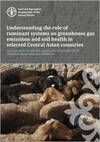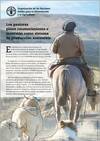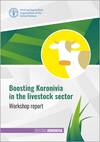This international GEMP Essentials guide is meant to support the advancement of key components of emergency management as countries continue efforts to work and prepare together. It sets out in a systematic way the elements required to achieve an appropriate level of preparedness and proposes an approach to animal health emergency management inclusive of all type of events, be they caused by natural phenomenon, including not infectious events, or by accidental or deliberate human action. The guide also includes the One Health approach.
Year of publication: 2021Organization: Food and Agriculture Organization of the United Nations (FAO)
Topic: Environmental services, Social services
Language: English
Type of document: Technical
Geographical coverage: Global
Like many other economies in transition, Kyrgyzstan, Tajikistan and Uzbekistan face the dual challenge of promoting development and reducing greenhouse gas (GHG) emissions, and ruminant systems are central for achieving both goals. This study found that enteric methane and manure management are the predominant sources of emissions from cattle systems; however, the study found that regions with high GHG emissions from the cattle systems also had the highest soil carbon stocks. This is mainly due to the high apportion of carbon into the soil from manure and organic amendments. Thus, in these regions, tailored practices could likely reduce GHG emissions through practices that can increase organic carbon storage. This project was the first step in understanding the role of ruminants through advanced GHG accounting methods and serve as a basis for these countries to take on larger climate investment projects and catalyse climate action through sustainable livestock development.
Year of publication: 2021Organization: Food and Agriculture Organization of the United Nations (FAO), Individual authors
Topic: Environmental services
Language: English
Type of document: Technical
Geographical coverage: Central Asia
Cette note de politique générale met en évidence la contribution économique du pastoralisme au niveau national, non seulement par la production et la vente de produits d'origine animale, mais aussi par l'autoconsommation des ménages. Elle présente les principaux besoins et défis auxquels sont confrontées les familles qui pratiquent cette activité au Tchad et souligne la nécessité pour les organisations locales de la société civile de collecter et de gérer les données relatives à ce secteur, ouvrant ainsi la voie au plaidoyer pour des politiques fondées sur des données probantes.
Year of publication: 2021Organization: Food and Agriculture Organization of the United Nations (FAO), Individual authors
Topic: Climate change, Economy, Food security, Resilience
Language: Français
Type of document: Policies and legislation
Geographical coverage: West Africa
Este documento da cuenta de cuál es el impacto económico del pastoreo a nivel nacional no solo mediante los ingresos obtenidos a través del mercado sino también del autoconsumo de los hogares. A su vez presenta las principales necesidades y desafíos que enfrentan las familias que llevan a cabo esta práctica en Argentina y destaca la necesidad de que las orga-nizaciones locales de la sociedad civil puedan recopilar y gestionar datos relevantes para el sector.
Year of publication: 2021Organization: Food and Agriculture Organization of the United Nations (FAO)
Topic: Climate change, Economy, Environmental services, Food security, Resilience, Social services
Language: Español
Type of document: Policies and legislation
Geographical coverage: Latin America
This video presents 5 scenarios of pastoralism in local development, built through a participative expertise by FAO and partners (CIRAD, ISRA and local organizations) in Burkina-Faso and Togo in 2019-2020. The participative territorial foresight provides decision makers with an innovative tool for dialog. 5 scenarios are described: Ideal, Oasis in the desert, Local crisis, Limited hope, Transhumance in spite of everything. Local stake- holders work together to make concrete proposal to their decision makers. Through a holistic understanding of the territory, they can move towards cross-border local development and achieve the objective of efficient territorial governance in order to live in harmony.
Year of publication: 2021Organization: Food and Agriculture Organization of the United Nations (FAO), Individual authors
Topic: Economy, Environmental services, Food security, Resilience
Language: English
Type of document: Videos
Geographical coverage: West Africa
The following meeting report "Boosting Koronivia in the livestock sector" is part of a webinar series and is related to the Koronivia Joint Work on Agriculture (KJWA) topic 2(e) Improved livestock management systems including agro-pastoral production systems and others. The objectives of the online workshops were to:
a) discuss the opportunities for livestock systems to be considered in national climate action, whilst at the same time enhancing livestock’s contribution to food and nutrition security, resilience and livelihoods; and b) exchange ideas and experiences on the best use of the KJWA outputs and roadmap to assist countries in including livestock targets in the national plans and actions.
Year of publication: 2021Organization: Food and Agriculture Organization of the United Nations (FAO)
Topic: Climate change, Environmental services, Participation
Language: English
Type of document: Technical
Geographical coverage: Latin America, West Africa, Eastern Africa, Southern Africa
La video présente 5 scenarios du pastoralisme dans le développement local, construits par une expertise participative de la FAO et ses partenaires (CIRAD, ISRA et organisations locales) au Burkina-Faso et au Togo en 2019-2020. La prospective territoriale participative fournit aux décideurs un espace de dialogue original. 5 scenarios sont décrits: Idéal, Oasis du désert, Crise locale, Transhumance malgré tout, Espoirs mitigés. Les acteurs locaux travaillent ensemble pour faire des propositions concrètes aux autorités politiques. A travers la compréhension holistique du territoire, ils imaginent un développement transfrontalier réalisant une gouvernance territoriale efficiente pour vivre en harmonie.
Year of publication: 2021Organization: Food and Agriculture Organization of the United Nations (FAO), Individual authors
Topic: Innovation, Participation, Resilience
Language: Français
Type of document: Videos
Geographical coverage: West Africa
La vidéo présente une méthode d’analyse des enjeux de la transhumance transfrontalière, mobilisant la réflexion sur le futur : la prospective territoriale. La méthode a été utilisée au cours d’une étude de cas participative conduite par la FAO et ses partenaires (CIRAD, ISRA et organisations locales) au Burkina Faso et au Togo en 2019-2020, pour permettre aux acteurs locaux d’imaginer différents futurs pour leur territoire, et comprendre comment et pourquoi ces futurs peuvent se produire. Deux questions ont été posées: quels pourraient être les futurs du territoire transfrontalier entre Togo et Burkina Faso en 2035? Quels rôles et quelles fonctions pourrait jouer le pastoralisme dans ces futurs ? Les participants identifient et hiérarchisent les forces motrices et construisent des scenarios.
Year of publication: 2021Organization: Food and Agriculture Organization of the United Nations (FAO), Individual authors
Topic: Innovation, Resilience
Language: Français
Type of document: Videos
Geographical coverage: West Africa









